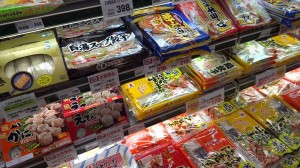 Tokyo Metropolitan Government (TMG) has a range of environmental programmes focused on food loss with the goal of a “Zero Wasting Tokyo”. Japan’s farm ministry estimates that 6.46 million tons of edible food was thrown out in 2015, of which slightly less than half came from households. That figure is almost twice the 3.2 million tons of food distributed to those unable to get enough to eat by the World Food Program in 2015.
Tokyo Metropolitan Government (TMG) has a range of environmental programmes focused on food loss with the goal of a “Zero Wasting Tokyo”. Japan’s farm ministry estimates that 6.46 million tons of edible food was thrown out in 2015, of which slightly less than half came from households. That figure is almost twice the 3.2 million tons of food distributed to those unable to get enough to eat by the World Food Program in 2015.
TMG’s planning section in the Bureau of Environment, Sustainable Materials Management Division worked with NTT Docomo, Japan’s largest mobile carrier on one pilot project this year. After downloading an app, Tokyo citizens upload photos of receipts and product expiry dates via ‘EcoBuy’, the smartphone app created by Docomo, to receive bonus points. 30 products sold in the Mini Piago Irifune supermarket in Tokyo’s Chuo ward were chosen, including everyday staples like bread, milk and eggs.
The objective of EcoBuy is to reduce the food waste from retailers and household by raising citizen’s awareness of food waste and allay fears about buying food near use buy dates.
In the experiment, users of Docomo’s “d-points” point-based membership programme visiting the supermarket were able to earn back around 20 percent of the purchase price of products with short expiration dates in the form of loyalty points. Users of Japanese e-commerce giant Rakuten’s ‘Edy’ e-money service were also able to receive points.
This was 20 times the amount of d-points a customer would usually receive through purchases. One point was worth ¥1 and points can be used at the roughly 30,000 stores throughout Japan participating in the programme. The mobile phone company has over 63 million d-point users.
This partnership with Docomo is part of a trend in an ongoing effort by public and private sector in Japan to reduce the immense quantity of food discarded by food companies and retailers each year. Food loss is a global phenomenon. The United Nations says 1.3 billion tons, or roughly one-third of the food produced in the world for human consumption, gets lost or wasted each year. That amounts to approximately £530 billion in industrialised countries and £241 billion in developing countries, it says.
In Japan, much of the blame is placed on a commercial practice known as the one-third rule, in which manufacturers customarily deliver goods to retailers before the first one-third term of the expiration date is up. Those that miss that deadline are generally discarded. The stores then typically sell products during the second one-third term. In the last term, goods are often sold with discounts or discarded.
Retail giant Aeon Co. announced last year their goal to cut food waste by 50% by 2025. As part of its effort, it said that starting in April it plans to change how it displays the best-before date on processed food items from year, month and date, to just year and month. The move is expected to improve efficiency in managing inventory.
The TMG ‘EcoBuy’ partnership with Docomo is just one of a range of project with joint public-private sector partners working onzero waste Tokyo programmes. EcoBuy is one of the trial TMG initiatives currently ongoing, the others being programmes to redistribute unwanted food to welfare centres within the metropolis, and a campaign to highlight reusable dishes and cups in the run up to the Tokyo 2020 Games. Clothes recycling programmes are also ongoing.
The EcoBuy app project ran for two months from mid-January until mid-March and the future trials are under consideration.
Ref アプリで食品ロスを削減する実証実験を開始 (LINK, Japanese only)

